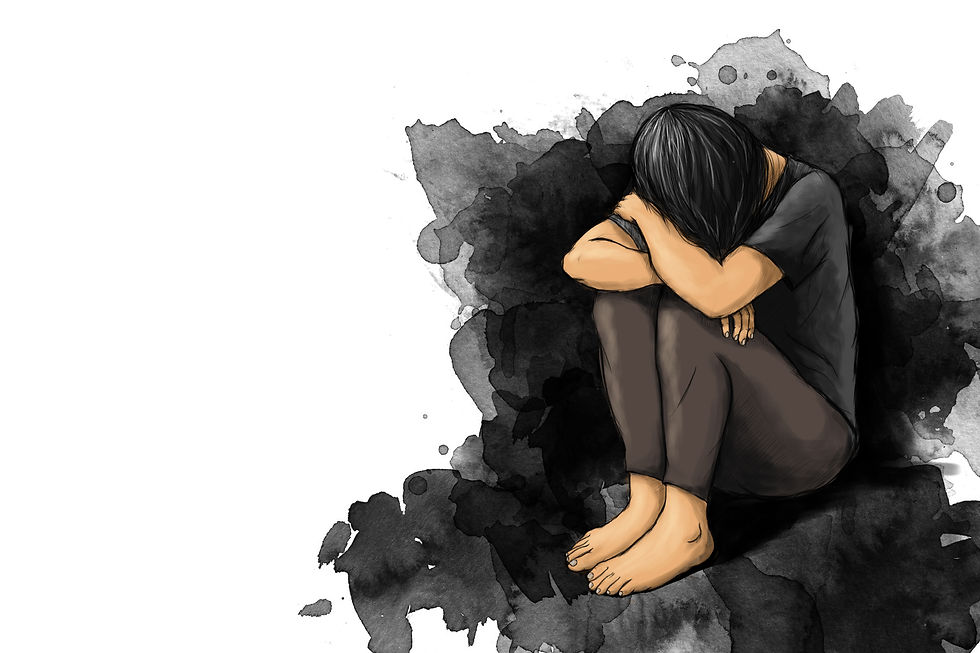Depression - Is this real?
- Mar 16
- 3 min read
What is Depression?
Depression is a mood disorder characterized by persistent sadness, loss of interest or pleasure, and various cognitive and physical symptoms that significantly impact daily life. It affects thoughts, feelings, and behaviors, sometimes leading to serious functional impairment.

DSM-5 Criteria for Major Depressive Disorder (MDD)
According to the Diagnostic and Statistical Manual of Mental Disorders (DSM-5), a diagnosis of Major Depressive Disorder (MDD) requires five or more of the following symptoms for at least two weeks, with at least one being either depressed mood or loss of interest/pleasure (anhedonia):
Depressed mood most of the day, nearly every day
Loss of interest or pleasure in almost all activities
Significant weight loss or gain, or changes in appetite
Insomnia or hypersomnia (sleeping too much or too little)
Psychomotor agitation or retardation (feeling restless or slowed down)
Fatigue or loss of energy
Feelings of worthlessness or excessive guilt
Difficulty concentrating, thinking, or making decisions
Recurrent thoughts of death or suicide
To be diagnosed, these symptoms must:
✔️ Cause significant distress or impair daily functioning
✔️ Not be caused by substance use or another medical condition
Causes of Depression
Depression is caused by a combination of biological, psychological, and social factors. Some key causes include:
1. Biological Causes
Genetics – Family history increases risk
Brain Chemistry Imbalance – Low levels of serotonin, dopamine, or norepinephrine
Hormonal Changes – Thyroid disorders, pregnancy, menopause, or chronic stress
Chronic Illnesses – Diabetes, heart disease, cancer, chronic pain
2. Psychological Causes
Trauma or Abuse – Childhood trauma, neglect, or domestic violence
Negative Thought Patterns – Self-criticism, overthinking, or perfectionism
Low Self-Esteem – Feeling unworthy or incapable
3. Social & Environmental Causes
Major Life Changes – Job loss, divorce, loss of a loved one
Loneliness or Social Isolation
Financial Stress or Work Pressure
Types of Depression
Major Depressive Disorder (MDD) – Persistent and severe symptoms affecting daily life
Persistent Depressive Disorder (Dysthymia) – Milder, long-term depression (2+ years)
Bipolar Depression – Depression episodes alternating with mania/hypomania
Postpartum Depression – Depression after childbirth
Seasonal Affective Disorder (SAD) – Depression related to seasonal changes
Atypical Depression – Mood reactivity, increased appetite, excessive sleep
What To Do?
If you are experiencing depression, here are some steps to take:
Mild to Moderate Depression:
✔️ Self-care Strategies:
Engage in physical activity (exercise releases endorphins)
Eat a balanced diet (avoid excessive sugar, caffeine, and processed foods)
Prioritize sleep (establish a sleep routine)
Practice mindfulness and meditation
Express emotions (through journaling, art, or talking to someone)
✔️ Social Support:
Reach out to friends and family
Join support groups
Engage in social activities
✔️ Therapy:
Cognitive Behavioral Therapy (CBT): Helps change negative thought patterns
Mindfulness-Based Therapy: Helps manage stress and emotions
Psychodynamic Therapy: Explores past traumas and emotional conflicts
✔️ Lifestyle Adjustments:
Set small goals and celebrate progress
Break tasks into manageable steps
Avoid alcohol and drugs

How Can SEVEE Help?
At SEVEE, we understand that depression is not just about sadness—it’s about feeling stuck and disconnected from yourself and the world. We offer:
✔️ One-on-One Online Counseling: Personalized sessions with trained psychologists who listen and guide you toward healing.
✔️ CBT & Mindfulness-Based Interventions: To help manage negative thinking and build emotional resilience.
✔️ Relationship & Breakup Support: Helping you navigate emotional struggles in relationships.
✔️ Stress & Anxiety Management: Tools to cope with daily stress and overthinking.
✔️ Confidential & Culturally Sensitive Support: We understand Indian and NRI clients' needs.
✔️ Psychiatrist Consultation (if needed): For expert advice on severe cases (no online prescriptions).
Book a session at www.sevee.care or call +91 9712777330 for support. You don’t have to go through this alone. SEVEE is here to help.
Depression & Mood Disorder Checklist (This is for educational purpose and not for diagnostic purpose, it is advised to see a professional if you are experiencing something that is difficult for you to deal with.)
Category | Mood | Energy Levels | Cognition & Focus | Behavioral Changes | Sleep Patterns | Treatment Options |
Mild Depression | Low mood, occasional sadness | Slight fatigue, but manageable | Mild difficulty concentrating | Social withdrawal, minor motivation loss | Slight changes in sleep | Self-help, therapy, lifestyle changes |
Moderate Depression | Persistent sadness, loss of interest | Noticeable fatigue, daily tasks feel harder | Frequent distraction, brain fog | Reduced social activity, lack of motivation | Insomnia or hypersomnia | Therapy, possible medication |
Severe Depression | Extreme sadness, hopelessness, suicidal thoughts | Severe exhaustion, struggle to function | Severe difficulty thinking or making decisions | Complete withdrawal, inability to function | Severe sleep disturbances | Urgent medical attention, therapy, medication |
Manic Episode | Euphoric, irritable, overly confident | Excessive energy, no need for sleep | Racing thoughts, easily distracted | Impulsive actions, risky behaviors | Little to no sleep without feeling tired | Psychiatric evaluation, mood stabilizers |
Hypomanic Episode | Elevated mood, increased energy | Increased energy, reduced need for sleep | Sharp focus on ideas but impulsive | Increased socializing, impulsivity | Decreased need for sleep | Therapy, mood tracking, medication if needed |

Comments